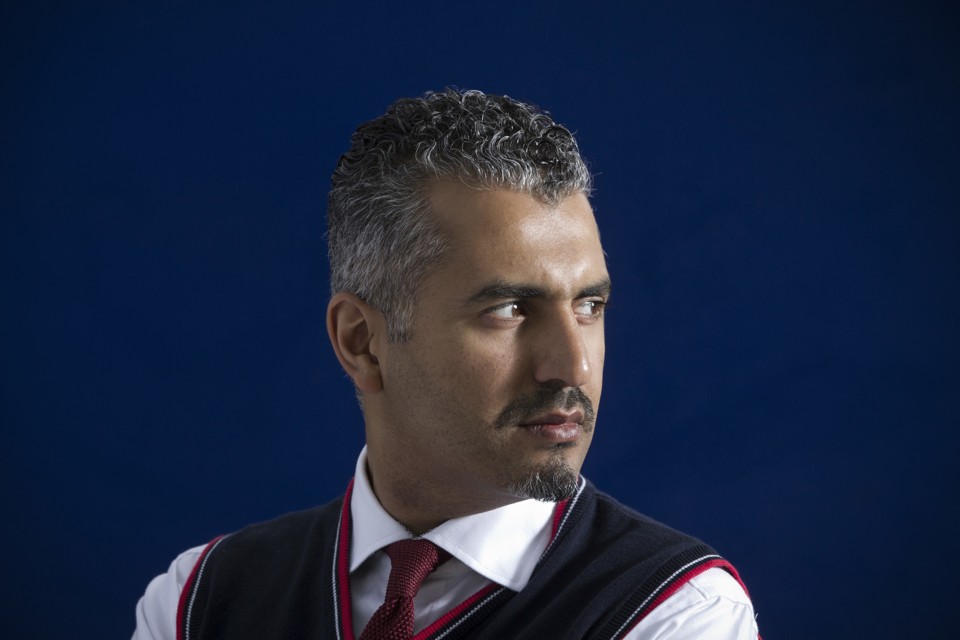 More on the infamy of SPLC putting Maajid on a list of "anti-Muslim extremists".
More on the infamy of SPLC putting Maajid on a list of "anti-Muslim extremists".
This one strikes me as a rather tepid defence of Maajid. Going to a strip joint, by a young man is "tasteless"?? Never been to one, writer of this article?
Anyway note how the SPLJ guy reacts, it's pathetic.
When earlier this week, the Southern Poverty Law Center and three other groups released a list of 15 "anti-Muslim extremists," many of the names came as no surprise. They included Pam Geller, who led the fight against the misleadingly nicknamed Ground Zero mosque, and her ally Frank Gaffney, who has called Barack Obama a crypto-Muslim and assailed Grover Norquist as a Islamist agent.
Others were more controversial, like Ayaan Hirsi Ali, who is beloved by some as a truthteller and reviled by others as a bigot.
But one name in particular stuck out: Maajid Nawaz, a British activist who runs the Quilliam Foundation, which calls itself "the world's first counter-extremism think tank." (It's named for Abdullah (né William) Quilliam, a British convert who opened the U.K.'s first mosque in 1889.)
Nawaz is a star in certain anti-terror circles, thanks to a compelling personal narrative: A self-described former extremist who spent four years in an Egyptian prison, he has changed approaches and now argues for a pluralistic and peaceful vision of Islam. He stood for Parliament as a Liberal Democrat in 2015, and advised Prime Ministers Tony Blair, Gordon Brown, and David Cameron.
Nawaz's work has earned him detractors—critics claim he has embellished or neatened his narrative, some attack him for opportunism, and others question his liberal bona fides—but calling him an "anti-Muslim extremist" is a surprise. Unlike the likes of Gaffney and Geller, he doesn't espouse the view that Islam itself is a problem; unlike Ali, who now describes herself as an atheist, Nawaz identifies as a Muslim.
When I spoke to Nawaz on Thursday, he was both baffled and furious.
"They put a target on my head. The kind of work that I do, if you tell the wrong kind of Muslims that I'm an extremist, then that means I'm an target," he said. "They don't have to deal with any of this. I don't have any protection. I don't have any state protection. These people are putting me on what I believe is a hit list."
Not that he took well to his inclusion on its merits, either.
"I'm the one who's a Muslim in this!" he said. "I'm listed there with people such as Pam Geller? It's unbelievable." He pointed out that he does things like appear in an Intelligence Squared debate arguing for the proposition—against Ali, in fact—that Islam is a religion of peace. ("I lost the vote," he said, with a tinge of bitterness.) He has also won praise for battling Islamophobes in the press.
The report cited several counts against Nawaz. One is that he tweeted a cartoon of Muhammad—an intentionally provocative act, given that many Sunnis find it blasphemous to depict the prophet, but one that doesn't fit neatly into the "anti-Islam" category. (Most Shiites don't object at all, but in any case, is simply committing a blasphemous act anti-Islam?) A second is that Nawaz visited a strip club in London during a bachelor party, which is true, tasteless, and seemingly irrelevant to the matter at hand.
How Did Maajid Nawaz End Up on a List of 'Anti-Muslim Extremists'?
Others were more controversial, like Ayaan Hirsi Ali, who is beloved by some as a truthteller and reviled by others as a bigot.
But one name in particular stuck out: Maajid Nawaz, a British activist who runs the Quilliam Foundation, which calls itself "the world's first counter-extremism think tank." (It's named for Abdullah (né William) Quilliam, a British convert who opened the U.K.'s first mosque in 1889.)
Nawaz is a star in certain anti-terror circles, thanks to a compelling personal narrative: A self-described former extremist who spent four years in an Egyptian prison, he has changed approaches and now argues for a pluralistic and peaceful vision of Islam. He stood for Parliament as a Liberal Democrat in 2015, and advised Prime Ministers Tony Blair, Gordon Brown, and David Cameron.
When I spoke to Nawaz on Thursday, he was both baffled and furious.
"They put a target on my head. The kind of work that I do, if you tell the wrong kind of Muslims that I'm an extremist, then that means I'm an target," he said. "They don't have to deal with any of this. I don't have any protection. I don't have any state protection. These people are putting me on what I believe is a hit list."
Not that he took well to his inclusion on its merits, either.
"I'm the one who's a Muslim in this!" he said. "I'm listed there with people such as Pam Geller? It's unbelievable." He pointed out that he does things like appear in an Intelligence Squared debate arguing for the proposition—against Ali, in fact—that Islam is a religion of peace. ("I lost the vote," he said, with a tinge of bitterness.) He has also won praise for battling Islamophobes in the press.
The report cited several counts against Nawaz. One is that he tweeted a cartoon of Muhammad—an intentionally provocative act, given that many Sunnis find it blasphemous to depict the prophet, but one that doesn't fit neatly into the "anti-Islam" category. (Most Shiites don't object at all, but in any case, is simply committing a blasphemous act anti-Islam?) A second is that Nawaz visited a strip club in London during a bachelor party, which is true, tasteless, and seemingly irrelevant to the matter at hand.